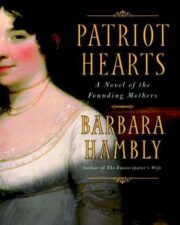But though Royall Tyler pleaded ardently for an early marriage with Nabby, and pointed to the large and handsome house he’d bought with its eighty acres of farmland, Abigail was beginning to have her doubts. Part of this was due to her own sister. Though Nabby might now hotly defend her suitor, and retort that her aunt Mary had her eye on Royall for a son-in-law herself, as Royall’s landlady Mary had a closer view of him than did anyone else in town. Sister Mary had spoken darkly, both to Abigail and to Nabby, of the young man still having some wild oats to sow. Abigail wondered, too, if Nabby’s sudden “understanding” with Royall had something to do with wanting to remain behind in Braintree.
In the end, when Abigail journeyed to Boston with Briesler and Esther—and a stock of provisions for the voyage including mustard, wine, a barrel of apples, several dozen eggs, tea, coffee, pepper, brown sugar, a sack of Indian meal, and a cow for milk, plus all their bedding, ewers, and chamber-pots—Nabby went with her. For a day or two before the Active sailed, they stayed with Abigail’s uncle Isaac Smith, and it was there, the day before their departure, that Abigail first met Thomas Jefferson.
“I have myself only just been appointed Minister Plenipotentiary in partnership with your husband,” he told her, that summer evening in Uncle Isaac’s wood-paneled company parlor. All the Smiths in Boston had come to bid her and Nabby farewell, and a wide assortment of Quincys, Storers, and Boylstons: that vast spun-steel kinship network that bound New England merchant families together. “Hearing you were in Boston, I came to offer you my escort to Paris.”
“See, Nabby?” Abigail remarked as she extended her hand. “Strange men still accost me out of the blue with offers of elopement to Paris at first acquaintance—not bad for forty.”
Nabby looked shocked, but appreciative laughter danced in Mr. Jefferson’s hazel eyes. He bowed deeply over her hand.
Slender for his gawky height and scholarly-looking, he was one of those fair-skinned sandy redheads who freckle or burn rather than tan, but there was an energy to him, a sort of shy friendliness that Abigail found enormously attractive.
“I’ve made arrangements to cross on the Ceres, out of New York, on the fifth of July, I and my daughter,” he went on, his soft, husky voice marked by slurry Virginia vowels and carelessness with the letter “r.” “If Mrs. Adams would care to accompany me back—”
“That’s very kind of you, Mr. Jefferson,” said Abigail. “But my daughter and I sail tomorrow.”
Jefferson looked disconcerted. By the fact that a woman wouldn’t wait for a gentleman’s escort before crossing the sea? Or because anyone would go ahead and make plans without consulting him? “I hadn’t heard of another ship bound for France that was prepared to take on passengers,” he drawled.
“The Active sails for London.” And, seeing the way those sandy brows shot down over the bridge of his nose, “We’re no longer at war with them, after all.”
“Does that matter, when one counts the dead?”
“If it did, no treaty would have validity and we should never be able to sleep in peace,” retorted Abigail, a little surprised at this prejudice from a man John had described as reasonable and educated. Then she took a second look at the lines of sleeplessness around his eyes, and recalled all she had heard of the viciousness of partisan fighting in the South. And she knew somehow it was his own dead of whom Jefferson spoke.
The Active put to sea on Sunday, June 20, 1784, and immediately began living up to her name. Her cargo was whale-oil and potash, and Abigail’s cow was not the only animal on board. These underlying stenches combined with the ground-in reek of unwashed clothing, sweating bodies, and every meal served and beer spilled in the course of every previous voyage.


"Patriot Hearts: A Novel of the Founding Mothers" отзывы
Отзывы читателей о книге "Patriot Hearts: A Novel of the Founding Mothers". Читайте комментарии и мнения людей о произведении.
Понравилась книга? Поделитесь впечатлениями - оставьте Ваш отзыв и расскажите о книге "Patriot Hearts: A Novel of the Founding Mothers" друзьям в соцсетях.